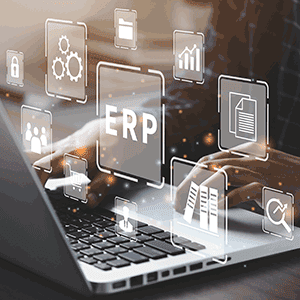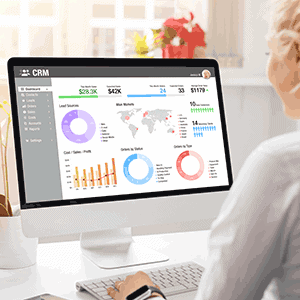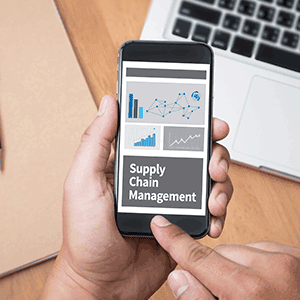One Product, Many Solutions - An Overview of Enterprise Software
Did You Know
The valuation of the worldwide enterprise software market was reported at USD 196.40 billion in 2021? Experts predict that this sector will experience a compound annual growth rate (CAGR) of 11.5% between the years 2022 to 2030.
– Grand View Research
Facts You Must Know
It is estimated that global revenue for enterprise application software will reach $478 billion in 2026.
– Statista
Types of Enterprise-Level Software
Did You Know
ERP is forecast to account for an additional 95 billion dollars this year?
– Statista

- Centralized database to integrate and manage core business processes like finance, accounting, HR, supply chain, and inventory.
- ERP streamlines operations, automates workflows, and enhances data accuracy.
- Provides real-time insights, reporting, and analytics for informed decision-making.
- Enables collaboration and communication across departments.
Facts You Must Know
The worldwide market size for Enterprise Resource Planning (ERP) software is anticipated to increase from $46.86 billion in 2023 to $71.34 billion by 2030.
– Fortune Business Insights
Facts You Must Know
The worldwide market for customer relationship management (CRM) software is set to expand to 49.6 billion U.S. dollars by 2025. This represents an anticipated growth of approximately four billion U.S. dollars from 2020, reflecting a compound annual growth rate (CAGR) of 1.7 percent.
– Statista

- Manages customer interactions, sales pipelines, and marketing campaigns.
- Tracks customer data, communication history, and buying patterns.
- Improves customer service, retention, and satisfaction.
- Provides sales forecasting, lead management, and performance tracking.
- Optimizes the flow of goods, materials, and information in the supply chain.
- Manages inventory, demand forecasting, procurement, and logistics.
- Enhances supply chain visibility and collaboration with suppliers.
- Reduces costs, improves efficiency, and ensures timely delivery.

- Streamlines HR processes, including employee data management, payroll, and benefits administration.
- Facilitates recruitment, onboarding, training, and performance management.
- Supports talent acquisition, retention, and succession planning.
- Enables workforce analytics and compliance with labor regulations.

Did You Know
The global market for business intelligence and analytics software applications is anticipated to expand in the forthcoming years, with a projected increase from 15.2 billion U.S. dollars in 2020 to over 18 billion U.S. dollars in 2025.
– Statista
- Gathers, analyzes, and visualizes data from various sources.
- Provides dashboards, reports, and data visualization for insights.
- Enables ad hoc querying and data discovery.
- Supports predictive analytics, data mining, and forecasting.

Did You Know
The global enterprise content management market had a value of 12.94 billion U.S. dollars in the year 2018? Projections indicate that this market will experience an increase, reaching 32.3 billion U.S. dollars by the year 2027.
– Statista
- Manages digital content, documents, and records within an organization.
- Facilitates document creation, storage, retrieval, and version control.
- Enables collaboration, workflow automation, and document sharing.
- Ensures compliance, security, and information governance.

Features of Enterprise Software Solutions
- Integration: These solutions offer integration capabilities to connect with existing systems and applications within the organization's IT infrastructure, ensuring seamless data flow and interoperability.
- Customization: Enterprise software solutions often provide customization options to align with specific business requirements and workflows, allowing organizations to tailor the software to their unique needs.
- Security: Robust security features are crucial for enterprise-level software solutions to protect sensitive data, ensure compliance with regulations, and safeguard against cyber threats. These features may include access controls, encryption, user authentication, and audit logs.
- Reporting and Analytics: Built-in reporting and analytics capabilities enable organizations to generate comprehensive reports, gain insights from data, and make data-driven decisions. These features often include customizable dashboards, data visualization tools, and ad hoc querying capabilities.
- Workflow Automation: Automation features help streamline and optimize business processes by automating repetitive tasks, reducing manual intervention, and improving overall efficiency. Workflow automation may include task scheduling, approval processes, and notifications/alerts.
- Collaboration and Communication: Many enterprise software solutions include collaboration tools and communication features to facilitate teamwork, knowledge sharing, and real-time collaboration. These features may include document sharing, messaging, project management, and virtual meeting capabilities.
Did You Know
It is projected that the collaboration software revenue will manifest a compounded annual growth rate (CAGR 2023-2028) of 2.00%, ultimately leading to a market size of US$16.12bn by 2028.
– Statista
- Mobile Accessibility: With the increasing mobility of the workforce, enterprise software solutions often provide mobile accessibility, allowing users to access and interact with the software through mobile devices, ensuring productivity and connectivity on the go.
- Scalability: Enterprise software solutions are designed to handle the complex needs of large organizations and can scale to accommodate growing user bases, increased data volumes, and expanding operations.
- Support and Maintenance: Vendors typically offer support and maintenance services for enterprise software solutions, assisting with implementation, troubleshooting, upgrades, and ensuring the software runs smoothly.
Weathering Storms with ERP - Advantages of Enterprise-Level Software Solutions
Facts You Must Know
The valuation of the worldwide enterprise application market was recorded at $238.36 billion in 2020, with a projected growth to $527.40 billion by the year 2030, exhibiting a compounded annual growth rate of 8.2% between 2021 and 2030.
– Allied Market Research
Best Enterprise-Level Software Solutions
Use Cases – Industries That ERP Can Transform
Manufacturing Industries
Retailers
Service providers
Healthcare
Financial institutions
Case-in-Point: Enterprise Software Solution
Refreshing Its Systems To Reach 2 Billion Customers - Coca-Cola
Coca-Cola operates globally with multiple production facilities, distribution centers, and sales channels. Reaching its 2 billion customers, with over 250 products in over 200 countries was a colossal challenge.
“We need to be very relevant and very precise to be cost effective with our marketing dollars, and to truly engage with our consumers with relevant messaging and offer them the products that they’re most interested in.”
- Keith Bartig, Director, Precision Marketing Technologies at the Coca-Cola Company
Implementing an enterprise software solution over Adobe Stack allowed Coca-Cola to streamline its operations by integrating various functions such as finance, procurement, supply chain, and manufacturing into a single platform. It enabled Coca-Cola to standardize its business processes across the organization, ensuring consistency, data integrity, and improved reporting capabilities.
These solutions helped Coca-Cola gain better visibility into its supply chain, from procurement to production and distribution. This led to accurate demand forecasting, optimized inventory management, and reduced lead times, leading to cost savings and improved customer satisfaction.
Besides, this solution empowered Coca-Cola with real-time financial insights, improved financial control, and streamlined financial processes.
Creating Unsurpassed Customer Experiences With ERP - Marriott International
Hospitality giant Marriott International needed a solution that would encompass its vast global operations with the central goal of providing the perfect customer experience every single time.
“We have to understand their preferences and to create the experiences we need to traverse Marriott’s physical properties as well as Marriott’s digital properties — and in some cases, our partner properties. Data and analytics are essential to the design of these experiences. We need the data to measure the outcomes of these experiences, and also figure out how to personalize the experiences for our customers.”
- Hurkan Balkir, Vice President of Architecture and Application Development at Marriott International.
Marriott International implemented an Enterprise Content Management (ECM) software solution to manage its digital content, which included marketing materials and customer information. This solution is the backbone of their loyalty program Marriot Bonvoy which has a reach of 140 million-plus members!
Using this solution, Marriott was able to improve collaboration and information sharing across the organization, thereby helping it to be more effective in marketing and customer service.
Ingenuity In Action With The Power Of ERP - Siemens
Innovative global technology provider for 170 years, Siemens needed an integrated, efficient process that would sustain growth and scalability. The company’s scattered landscape led to slow delivery timelines and a lack of flexibility. This resulted in an inability to meet business demands.
"In the past, we did not really have any platforms. Rather, we had scattered solutions provided either for the automation of our value chain processes in HR, sales, finance, and product development. These were all individual solutions."
- Hanna Hennig, CIO of Siemens.
Implementing an enterprise software solution helped Siemens not only supported their employees worldwide during and after the pandemic but also implement new forms of work effectively.
Hanna Hennig says,
"We were able to scale our services quickly and smoothly in order to put 300,000 employees in a position to work from home. With more than 800,000 online meetings per day, we are already enabling them today to collaborate effectively without being at the same location."
Processing 830 Million Orders Seamlessly - Walmart
Walmart, a large procurement operations business that has 100,000 plus suppliers and many more customers, was looking for a solution that would empower them to engage with them optimally.
Walmart has partnered with Salesforce to offer retailers access to Walmart's scalable technologies. By leveraging these solutions, retailers can provide personalized and convenient shopping experiences that include real-time order tracking, and dependable local pickup, and delivery services.
Walmart implemented an inventory management software solution to reduce supply chain costs and minimize wastage. By providing real-time data and analytics, the solution enabled the company to optimize its inventory levels, reduce overstocking and stockouts, and improve its operational efficiency.
"The technology utilized by Walmart to successfully process over 830 million orders through its 4,700 stores."
- Anshu Bhardwaj, senior vice president, Walmart Global Technology.
After implementing a software solution, Walmart experienced less than 1% of invoice discrepancies. – Harvard Business Review.
Express Jump From Now To Next - FedEx
As a specialized logistical service company, FedEx needed an efficient information system.
"Brands and merchants have to move quicker than ever to meet their customers' expectations. With the combined power of Salesforce and FedEx, we will provide them the speed, control, and economics they need to help them exceed those expectations. From optimizing their inventory management and fulfillment operations, to faster delivery and attracting new buyers, together we're helping change the game so brands and merchants can have greater control over the links of their supply chain and increase their competitiveness."
- Claude Russ, COO of FedEx Dataworks and CEO of ShopRunner
Implementing CRM enabled Fedex to provide faster, easier, and cost-efficient experiences to its customers.
The Secret Behind Becoming Earth's Most Customer-Centric Company - Amazon
Amazon has over 2.5 million active sellers at Amazon. The need to ensure consistent operations throughout the cycle of operations for all these sellers is a colossal task, to say the least.
However, Amazon has been making this possible using the SAP suite of products as its ERP system. Considering the vast e-commerce operations it enables, Amazon needs a range of enterprise software solutions to support them. They use things like customer relationship management (CRM), supply chain management (SCM), and business intelligence tools to keep everything running smoothly. Plus, they developed a technology infrastructure that is top-notch and can handle their exponential growth.
The Amazon ERP integration is a force of its own. It provides sellers on Amazon a seamless experience with the trinity of selling - order, inventory, and account management.
In this way, Amazon implemented enterprise software solutions to optimize its operations, improve efficiency, enhance customer experience, and support its various business units, including e-commerce, cloud computing, supply chain, and more.
Choose The Perfect Enterprise Application Software for Your Business
- Conduct Market Research: Just like an explorer maps out uncharted territories, begin by exploring the vast landscape of available enterprise application software. Dive into industry reports, attend conferences, and engage in online forums to gather insights about different software options. Identify the leading vendors, their track records, and the solutions they offer.
- Document Your Requirements: Imagine yourself as an architect, meticulously sketching the blueprint for your dream home. Similarly, document your business requirements and objectives in detail. Identify the specific features, functionalities, and integrations you need from the enterprise application software. Consult with stakeholders from various departments to ensure comprehensive coverage of their needs.
- Budget Carefully: Like a wise treasure hunter who manages their resources strategically, carefully assess your budget for the enterprise application software. Consider both the upfront costs and the long-term expenses, such as licensing fees, implementation costs, and ongoing support. Factor in potential customization or integration expenses. By establishing a realistic budget, you can focus on solutions that align with your financial capabilities.
- Fix the Project Timeline: Remember, a well-planned timeline keeps you on track and helps you avoid unnecessary delays. Hence, determine critical milestones, such as vendor evaluations, demos, and decision-making deadlines. Allocate sufficient time for testing and training to ensure a smooth transition.
- Find the Right Development Team: In this search, you need a team of skilled adventurers to navigate the challenges. Seek out software development teams or vendors with a proven track record and expertise in your industry. Evaluate their experience, qualifications, and references to ensure they align with your requirements and provide valuable guidance and support.

